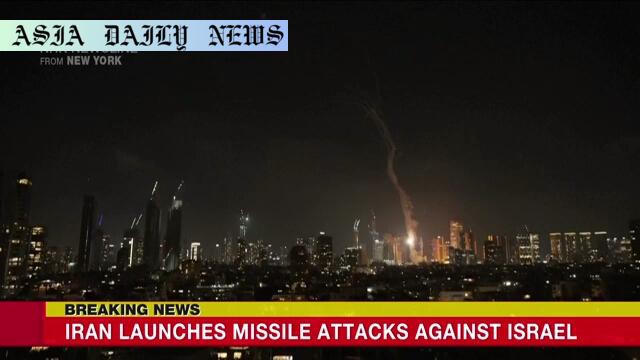Iran missile attacks ignite tensions with hundreds of ballistic missiles launched in retaliation against Israel’s Friday strikes.
Iran has initiated a large-scale missile attack against Israel.
Hundreds of ballistic missiles reportedly launched in retaliation.
The action follows Israeli strikes on over 100 targets last week.
Rising security and military tensions are gripping the region.

Background of the Conflict
The escalating conflict between Iran and Israel has reached new tensions with Iran launching hundreds of ballistic missiles targeting Israel. According to Iranian state-run television, this attack is perceived as retaliation for Israel’s recent airstrikes on more than 100 targets. The region, already fraught with decades-long animosity, has seen a sharp surge in violence over the past few days with both nations exchanging significant military firepower.
Friday marked one of the most aggressive Israeli offensives, with attacks concentrated across key Iranian military infrastructures reportedly involved in sponsoring regional militia groups. In a swift response, Iran’s military declared its intentions to “eliminate” threats and assertively retaliated with what appeared to be pre-planned missile strikes aimed at Israel’s strategic locations.
Details of the Missile Attacks
Reports, including those from Reuters, highlight that hundreds of ballistic missiles were launched, demonstrating an unprecedented escalation. These ballistic missiles, capable of targeting far-reaching areas within minutes, underscore Iran’s advanced military capabilities. While official casualty figures are yet to emerge, the magnitude of the attacks suggests severe implications for both sides. Initially, international monitors observed heightened military operations in zones vulnerable to direct conflict spillovers, such as the Golan Heights.
The regional backlash has swiftly garnered international attention, with calls for a thorough investigation and the de-escalation of tensions. Key global stakeholders, including the United Nations, have emphasized their concerns regarding the destabilization effect this ongoing hostility could impose on the Middle East.
Potential Global Implications
Geopolitically, this development could ignite wider instability across the region, severely impacting neighboring countries already dealing with political and humanitarian conflicts. Oil markets, which rely on stable transit through the Middle East, are particularly susceptible as these escalations continue. Meanwhile, neighboring Gulf states increasingly pressure global superpowers to intervene diplomatically before military fatalities expand further.
Foreign policies from nations such as the United States and Russia will likely play a pivotal role in the coming days. Both nations maintain strategic ties to the key warring nations and have frequently sought to mediate negotiations in past aggressive escalations. However, with tensions now at peak levels, all diplomatic conversations currently remain strained due to evident distrust between opposing parties.
Efforts Toward De-escalation
The international community has voiced continuous concerns for an immediate ceasefire amid fears of this conflict spreading to broader fronts. While attempts have been made to engage Iran and Israel through third-party mediators, no tangible breakthroughs have emerged thus far. Humanitarian organizations operating within afflicted territories are currently ramping up aid campaigns to assist severely impacted civilians and displaced communities. However, mounting security barriers continue hampering their operations within conflict zones.
Ultimately, observers agree that long-term stability requires a multifaceted approach combining political compromises and substantial ceasefire frameworks—both of which seem increasingly difficult amidst persisting retaliatory rhetoric from Tehran and Jerusalem. Until then, the Middle Eastern civilians will continue bearing the adverse consequences wrought by these conflicts directly.
Commentary
Iran-Israel Escalation: A Grave Concern for the Region
The escalating military tension between Iran and Israel is not just a regional security issue but also a reflection of deep-seated animosities that have persisted for decades. With Iran’s massive ballistic missile strikes against Israel, seemingly as retaliation for last week’s airstrikes, we are witnessing a frightening escalation of violence that could spiral into full-blown chaos. The magnitude of the current back-and-forth military actions underlines the fragility of the already volatile Middle East.
The Broader Impact on Civilians and Political Stability
This conflict’s direct impact falls heavily on the shoulders of innocent civilians who face the brunt of physical destruction and socio-political instability. Beyond physical casualties lies the long-term psychological trauma and devastating disruption to livelihoods. Schools, hospitals, and vital infrastructure remain at risk as targeted military operations often inadvertently impact civilian spaces, creating waves of humanitarian crises requiring more than temporary aid solutions.
Global Reactions and the Need for Multilateral Action
The responses from the international community, while critical, often come across as delayed or insufficiently impactful. Global superpowers need to step into the fray by using diplomatic leverage to enforce immediate ceasefires or risk further destabilization across a politically delicate region. Neither Iran’s missile strikes nor Israel’s counterattacks seem poised to de-escalate on their own accord. Multilateral intervention will not only ensure greater accountability but potentially carve out paths to reduce recurring cycles of conflict.
An Urgent Call for Dialogue and Resolution
The focus for both sides should shift swiftly towards dialogue rather than aggressive military deterrence, which historically has proven ineffective. Creating an atmosphere conducive to mutual understanding will require bold leadership, the reduction of incendiary rhetoric, and prioritization of peacebuilding measures. Until these steps are undertaken, the cycle of violence risks becoming an unending spiral, leaving destruction and tragedy in its wake.


